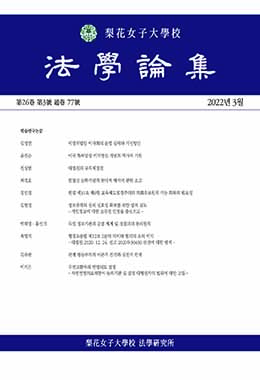일본 정부는 후쿠시마 원전의 방사능 오염수를 2023년 봄부터 태평양으로 해저터널을 통해 방류하기로 하였다. 우리 정부는 일본의 후쿠시마 방사능 오염수의 해양방류가 런던의정서 제2조의 “모든 오염원으로부터 해양환경을 보호해야할 의무”를 준수하지 않는 것이 될 수 있다는 우려를 런던협약/런던의정서 당사국총회 등에서 제기하였고, 원전오염수의 해양방류가 가져올 환경에 대한 영향이 불확실하기 때문에 ‘사전주의’접근에 따라, 오염수의 해양 방류전에 충분한 논의가 이루어져야한다고 주장하였다.
이에 대해 일본 정부는 후쿠시마 방사능 오염수의 해양방류는 투기가 아니고 육상 기원오염이기 때문에 런던의정서의 적용대상이 아니라고 주장하였다. 2021년 런던의 정서 당사국총회는 이 문제와 관련하여, IMO 사무국의 법적 조언을 구하기로 결정하였고, 2022년 10월에 개최예정인 당사국총회에서 IMO 사무국의 법적 조언이 제출되고 논의가 될 예정이다.
이 논문에서는 런던협약/런던의정서 당사국총회와 런던의정서 준수그룹에서 우리 정부가 주장한 내용과 일본정부의 주장, 그리고 당사국총회에 참석한 국가들의 입장과 당사국총회의 결정사항 등을 살펴봄으로써 일본의 후쿠시마 원전 방사능 오염수 해양방류에 대해 런던의정서가 적용될 수 있는지를 검토한다.
또한, 후쿠시마 원전 오염수가 런던의정서 제1조가 정의한 “투기”에 해당하여 런던 의정서가 적용될 수 있음을 주장한다. 아울러, 우리나라와 일본간에 런던의정서 제1조와 제2조의 해석과 적용에 대해 분쟁이 발생하였다고 볼 경우, 런던의정서 부속서3의 중재절차를 활용하는 것을 우리정부가 고려할 것을 제안한다. 중재절차는 국제법상 국가간 분쟁의 평화적 해결수단으로서 활용되어 왔기 때문에 한일간의 후쿠시마 방사능 오염수와 관련한 분쟁의 해결수단으로 시도해볼 여지가 있다고 생각된다.
The Japanese Government decided to discharge Fukushima Radioactive Water into the Pacific Ocean by the pipeline facilities starting from Spring 2023. The Governmen of the Republic of Korea expressed concern regarding the decision on the discharge of wastewater from the Fukushima Daiichi Nuclear Power Plant into the sea, maintaining that the issue should be discussed in London Convention/London Protocol meetings. In 2020 LC/CP meetings, the republic of Korea, in commenting on the progress report by the London Protocol Compliance Group, suggested that such activities could represent an issue of non-compliance of the obligation under Article 2 of the London Protocol. The Republic of Korea suggested that in line with a precautionary approach, it is necessary to have discussions in LC/LP meetings to find appropriate plans for the disposal of radioactive wastes through the sharing of information.
The Government of Japan was concerned about the Republic of Korea’s proposal to discuss discharges from land-based facilities in LC/LP meetings, since it has grave implications of broadening the scope of the LC/LP regulations to include the discharges of wastes and other matter from land-based facilities, which is clearly not subject to the regulations of the LC/LP.
In 2021, the governing bodies of LC/LP requested the Secretariat (IMO) to provide legal advice on the issue of the scope of the LC/LP, in particular in relation to discharges from land-based facilities, to the next meeting of the governing bodies in 2022. Japan objected the proposal to seek legal advice on the issue of the scope of the LC/LP. The Republic of Korea stated that the legal advice should focus specifically on the Fukushima Daiichi Nuclear Power Plant.
This article reviews the applicability of the London Protocol to the discharge of Fukushima Radioactive Water into the sea. It argues the discharge of radioactive water from sea tunnel into the sea around 1 km from the seashore may constitute “dumping” under the London Protocol since it may be “any deliberate disposal into the sea of wastes or other matter from other man-made structures at sea” under Article 1. 4.1.1 of the London Protocol.
Moreover, it points out that there is dispute settlement mechanism under the London Protocol, namely, Article 16 of the London Protocol and the Annex 3 of the London Protocol. In particular, the Annex 3 of the London Protocol provides “Arbitral Procedure”.


